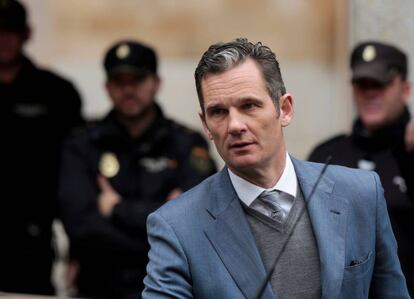A question mark over Spain’s legal system
A questionable decision regarding Iñaki Urdangarin is made worse by suspicions about the public prosecution service

Iñaki Urdangarin will not go to prison for now. That is logical, as the prosecutor had not requested this measure, nor were there any good reasons to deviate from the usual procedure in these cases: there is no prison until the verdict is final and beyond appeal.
What does seem more anomalous, however, is the fact that Urdangarin is being allowed to remain in Switzerland, authorized to present himself before the relevant authorities there once a month, while he is instructed to keep the court appraised of any movements he may make “outside of the European Union.”
Justice should express itself through solid proceedings and rulings, not through the media or personal opinions
But it just so happens that Switzerland is not part of the European Union. Iñaki Urdangarin is a Spaniard living there not because of any special attachment to the country, but out of a personal and family decision made a few years ago in a bid to avoid the spotlight after legal proceedings were initiated against him. As such, the practical effect of this measure is to grant a hardly justifiable advantage to someone who has been sentenced to six years and three months in prison, no matter how appealable this ruling may be.
It is true that provisional detention is often abused in Spain, and the Palma de Mallorca judges did the right thing by not going down that road. They also refused to set the bail requested by the prosecutor in the case, Pedro Horrach, whose own hesitating attitude became patent through a string of media statements that he made in the days leading up to the hearing, when he should have displayed a more appropriate discretion following his controversial handling of the Nóos case.
The background against which the Urdangarin decision was handed down makes the situation even more serious: 28 heads of key agencies within the public prosecution system have just been relieved of their duties, including the Chief Attorney of Murcia, Manuel López Bernal, who had just taken legal action against the regional premier for alleged crimes in the construction of a local auditorium. López Bernal is now going public with allegations of intimidation and pressure during investigations of corruption cases and complaining about the defenseless position he and other colleagues say they find themselves in.
The changes taking place at so many key attorney’s offices, including Anti-corruption and at the Audiencia Nacional, Spain’s central high court, require an explanation. Attorney General José Manuel Maza must offer reasons for these changes that go beyond the formal argument that these individuals’ terms had expired and that he is empowered to appoint other people. The public prosecution service is a constitutional body that answers to the Attorney General —who is appointed by the government—, and it should act as a guarantor of justice for citizens. Far from it, however, it has become an object of mistrust, given the constant suspicions about government interference.
Justice should express itself through solid proceedings and rulings, not through the media or through the personal opinions of the people in charge of administering justice or triggering inquiries. Constant noise and political meddling do nothing to add prestige to the institution in the eyes of Spaniards.
English version by Susana Urra.
Tu suscripción se está usando en otro dispositivo
¿Quieres añadir otro usuario a tu suscripción?
Si continúas leyendo en este dispositivo, no se podrá leer en el otro.
FlechaTu suscripción se está usando en otro dispositivo y solo puedes acceder a EL PAÍS desde un dispositivo a la vez.
Si quieres compartir tu cuenta, cambia tu suscripción a la modalidad Premium, así podrás añadir otro usuario. Cada uno accederá con su propia cuenta de email, lo que os permitirá personalizar vuestra experiencia en EL PAÍS.
¿Tienes una suscripción de empresa? Accede aquí para contratar más cuentas.
En el caso de no saber quién está usando tu cuenta, te recomendamos cambiar tu contraseña aquí.
Si decides continuar compartiendo tu cuenta, este mensaje se mostrará en tu dispositivo y en el de la otra persona que está usando tu cuenta de forma indefinida, afectando a tu experiencia de lectura. Puedes consultar aquí los términos y condiciones de la suscripción digital.








































